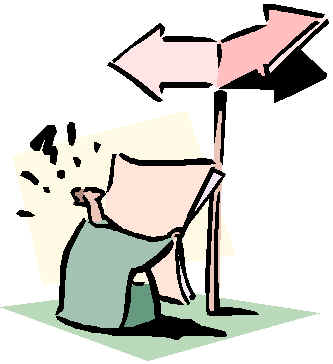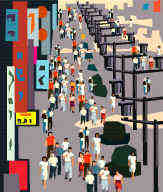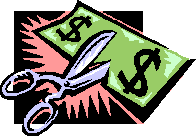Trade Tips
Trade
Defensively. In football terms, "the
most important rule is to play defense, not offense". Think
about what you could lose as opposed to what you could gain. Anticipate the "what
ifs" and plan ahead, rather than have to react after the
fact. To trade defensively, assume that the market is going to go against you.
Calculate your maximum possible drawdown. Adjust your stop points, if necessary,
to where you're comfortable. Develop a plan to get out of the market. Then if
the market moves against you, you are prepared. Protect
what you have.
opposed to what you could gain. Anticipate the "what
ifs" and plan ahead, rather than have to react after the
fact. To trade defensively, assume that the market is going to go against you.
Calculate your maximum possible drawdown. Adjust your stop points, if necessary,
to where you're comfortable. Develop a plan to get out of the market. Then if
the market moves against you, you are prepared. Protect
what you have.
Develop a trading plan and adhere to it. Every
trader should develop a personal methodology for trading.  The
methodology, or trading model, maybe based on fundamental factors, technical
indicators or a combination. Before you commit funds in the market, get some
evidence that your trading methodology is sound and profitable. An important
part of your trading plan is to set a limit on what you are willing to lose. If
you reach that limit. GET OUT.
Stick to your trading plan and avoid impulse trades. If you don't follow your
plan, you have no plan. A sound trading plan will also give you needed
confidence under pressure. With specific guidelines to follow, you will also be
less likely to trade impulsively. Do not follow a trading plan blindly, however.
If you do not understand what the market is doing or if your emotional
equilibrium is severely disturbed, then close out all positions. In developing
your trading strategy, don't invest on the basis of market tips or rumors. It is
your money that will be at risk. Before you trade, do your homework.
The
methodology, or trading model, maybe based on fundamental factors, technical
indicators or a combination. Before you commit funds in the market, get some
evidence that your trading methodology is sound and profitable. An important
part of your trading plan is to set a limit on what you are willing to lose. If
you reach that limit. GET OUT.
Stick to your trading plan and avoid impulse trades. If you don't follow your
plan, you have no plan. A sound trading plan will also give you needed
confidence under pressure. With specific guidelines to follow, you will also be
less likely to trade impulsively. Do not follow a trading plan blindly, however.
If you do not understand what the market is doing or if your emotional
equilibrium is severely disturbed, then close out all positions. In developing
your trading strategy, don't invest on the basis of market tips or rumors. It is
your money that will be at risk. Before you trade, do your homework.
Control
Your Emotions. Recognize that all traders experience high levels
of stress and suffer losses from time to time. Anxiety, frustration, depression and at times desperation, are all part of the trading
game. Part of risk management is the ability to control these emotions. Don't
let these emotions take control of your trading. Stay focused on what you are
doing. Trade on the basis of informed, rational decisions, not emotions and
wishful thinking. Taking an occasional day off may help you reduce stress and
maintain a positive attitude. If you have been doing well, it is a well-deserved
reward. If you have doing poorly, the break help you avoid battle fatigue and
may help you see the market with a different perspective. A local stress
management program may also provide important help.
frustration, depression and at times desperation, are all part of the trading
game. Part of risk management is the ability to control these emotions. Don't
let these emotions take control of your trading. Stay focused on what you are
doing. Trade on the basis of informed, rational decisions, not emotions and
wishful thinking. Taking an occasional day off may help you reduce stress and
maintain a positive attitude. If you have been doing well, it is a well-deserved
reward. If you have doing poorly, the break help you avoid battle fatigue and
may help you see the market with a different perspective. A local stress
management program may also provide important help.

If in doubt, Get out. Personal
doubts indicate that something is wrong with your game plan. Get out of the
market quick if: 1) you don't know what to do 2) you can't sleep at night.

Know Yourself. You need an
objective temperament, an ability to control emotions, and to carry a position
without losing sleep. Although trading discipline can be developed the
successful trader appears to be unemotional about their positions. There are
many exciting things happening in the market everyday, so it takes a hard-nosed
type of attitude and an ability to stand above short term circumstances, or
you'll be changing your mind and your position every few minutes.

Don't Over Commit. One rule of
thumb is to keep at least two times the money in your margin accounts that is
needed for a particular position. Reduce your position, if necessary, to conform
to that rule. This rule helps you avoid trading decisions based on the amount of
money in your margin account.
 Isolate
your Trading from your Desired Profits. Don't hope for a move so
much that your trade is based on HOPE.
Although hope is a great virtue in other areas of life, it can be a great
hindrance to a trader. When hoping that the market will turn around their favor,
speculators often violate basic trading rules.
Isolate
your Trading from your Desired Profits. Don't hope for a move so
much that your trade is based on HOPE.
Although hope is a great virtue in other areas of life, it can be a great
hindrance to a trader. When hoping that the market will turn around their favor,
speculators often violate basic trading rules.
 Don't
Form New Opinions During trading Hours. Decide on a basic course of
action, don't let the ups and downs during the day upset your trading plan.
Decisions made during the trading day based on the price movement or news item
are usually disastrous. Formulate a basic trading plan before the market opens
or before opening a trade, then look for a proper time to execute the decision
that has been made.
Don't
Form New Opinions During trading Hours. Decide on a basic course of
action, don't let the ups and downs during the day upset your trading plan.
Decisions made during the trading day based on the price movement or news item
are usually disastrous. Formulate a basic trading plan before the market opens
or before opening a trade, then look for a proper time to execute the decision
that has been made.

Take a Trading Break.
One successful trader commented. "When I fall to 90% of mental
efficiency, I began to break even. Anything below that I begin to lose."
A trading breaks helps you take detached view if the markets, and tends to give
a fresh look at yourself and the way you want to trade for the next several
weeks.

Don't Follow the Crowd. When everyone
seems to be long, they took for a reason to be short. When most of the advisory
services are long, for example, the successful trader gets ready to move to the
sideline or to take a short position.
 Block
Out Other Opinion. Don't be influenced in your trading by what
someone says, or you will continually change your mind. If you listen to these
outside views, you may be tempted to change your mind only to find later than
holding your own opinion would have been more profitable.
Block
Out Other Opinion. Don't be influenced in your trading by what
someone says, or you will continually change your mind. If you listen to these
outside views, you may be tempted to change your mind only to find later than
holding your own opinion would have been more profitable.
 Don't
trade too Many Currencies at Once. You'll hurt yourself if you try to
have the necessary information and "feel" of several markets. Learn to
know your limitations, and trade within these limits.
Don't
trade too Many Currencies at Once. You'll hurt yourself if you try to
have the necessary information and "feel" of several markets. Learn to
know your limitations, and trade within these limits.
Never Add to a Losing
Position. Regardless of how confident you fell, if you establish a
position that shows a loss, don't add to it.
 Cut
Your Losses Short. When the market moves against you admit your
mistake by liquidating your position. You can still be successful even if you
are right on only 50% of your trades if you keep your losses short and let your
profits run. One of the most common failures of new traders is their ability to
admit they're wrong. It takes a great deal of discipline to overcome the
temptation to hang on a loss, hoping that the market will turn in your favor.
Cut
Your Losses Short. When the market moves against you admit your
mistake by liquidating your position. You can still be successful even if you
are right on only 50% of your trades if you keep your losses short and let your
profits run. One of the most common failures of new traders is their ability to
admit they're wrong. It takes a great deal of discipline to overcome the
temptation to hang on a loss, hoping that the market will turn in your favor.
Let Profit Run.
Successful traders say you should never take a profit just for the sake of
taking a profit--have a reason to close out a profitable position.
Be Patient with Losing
Position. Never carry a losing position over two or three days, and
never over a weekend. This is what you called forced-discipline. Although it
sounds very simple to say "cut your losses short"; it's a tough area
even for seasoned traders.
Learn to Like Losses.
Traders must learn to like losses because they are part of the business. When
you gain the emotional stability to accept a loss without hurting your pride,
you are on your way to becoming successful speculator. The fear taking a loss
must be first removed in order to become a good trader.
Use Stop Orders
Cautiously. Stop loss helps you cut your losses short. An important
factor is to determined your stop loss point when place your order. Remember
that stop loss should be used with great discretion because stops that are
placed too tight can put you out of the market with a loss very quickly. You can
become "whipsawed" by poor placement of stops.
Buy Bullish News Sell
the Facts. If market rumors are bullish, then you should buy on the
news. But when the news reports turn into reality, then it is time to "sell
the facts."
Look for Good Odds.
Look for opportunities where the loss potential is small in relation to the
profit potential is small in relation to the profit potential. Watching trading
ranges over a year or several years helps you have perspective to determine the
odds. Market fundamentals are also helpful in determining the "high-odd"
situation.
 Always
Take Windfall Profits. Sometimes you take a position and
after a short while you have more profits than you ever expected. Rather than
watching the market a while longer trying to figure out why the profits came so
fast, "take quick
profits and run."
Always
Take Windfall Profits. Sometimes you take a position and
after a short while you have more profits than you ever expected. Rather than
watching the market a while longer trying to figure out why the profits came so
fast, "take quick
profits and run."
Act Promptly.
The futures market is not kind to those who procrastinate. Therefore, the rule
of thumb is Act Promptly. This doesn't mean that you should be impulsive, but if
your judgement says you should liquidate a position, do it immediately.
Don't Reverse Your
Position. When your position is at a loss and you decide to get out,
don't make a 180-degree turn. If you reverse your position outright you might
get whipsawed losing as the market goes down, then losing more as the market
goes up.
Know the Price Trend.
You can identify major markets trends by using charts. It helps costly errors of
buying and selling decisions.
Use the Halfway
Rule in Picking Buy or Sell spots. This means finding out over
what range the currency has been trading, and then buying at the lower half of
that range, or selling at the upper half. This rule is particularly useful in
trading in a situation where the market is trading within the channel.
 opposed to what you could gain. Anticipate the "what
ifs" and plan ahead, rather than have to react after the
fact. To trade defensively, assume that the market is going to go against you.
Calculate your maximum possible drawdown. Adjust your stop points, if necessary,
to where you're comfortable. Develop a plan to get out of the market. Then if
the market moves against you, you are prepared. Protect
what you have.
opposed to what you could gain. Anticipate the "what
ifs" and plan ahead, rather than have to react after the
fact. To trade defensively, assume that the market is going to go against you.
Calculate your maximum possible drawdown. Adjust your stop points, if necessary,
to where you're comfortable. Develop a plan to get out of the market. Then if
the market moves against you, you are prepared. Protect
what you have. The
methodology, or trading model, maybe based on fundamental factors, technical
indicators or a combination. Before you commit funds in the market, get some
evidence that your trading methodology is sound and profitable. An important
part of your trading plan is to set a limit on what you are willing to lose. If
you reach that limit. GET OUT.
Stick to your trading plan and avoid impulse trades. If you don't follow your
plan, you have no plan. A sound trading plan will also give you needed
confidence under pressure. With specific guidelines to follow, you will also be
less likely to trade impulsively. Do not follow a trading plan blindly, however.
If you do not understand what the market is doing or if your emotional
equilibrium is severely disturbed, then close out all positions. In developing
your trading strategy, don't invest on the basis of market tips or rumors. It is
your money that will be at risk. Before you trade, do your homework.
The
methodology, or trading model, maybe based on fundamental factors, technical
indicators or a combination. Before you commit funds in the market, get some
evidence that your trading methodology is sound and profitable. An important
part of your trading plan is to set a limit on what you are willing to lose. If
you reach that limit. GET OUT.
Stick to your trading plan and avoid impulse trades. If you don't follow your
plan, you have no plan. A sound trading plan will also give you needed
confidence under pressure. With specific guidelines to follow, you will also be
less likely to trade impulsively. Do not follow a trading plan blindly, however.
If you do not understand what the market is doing or if your emotional
equilibrium is severely disturbed, then close out all positions. In developing
your trading strategy, don't invest on the basis of market tips or rumors. It is
your money that will be at risk. Before you trade, do your homework. frustration, depression and at times desperation, are all part of the trading
game. Part of risk management is the ability to control these emotions. Don't
let these emotions take control of your trading. Stay focused on what you are
doing. Trade on the basis of informed, rational decisions, not emotions and
wishful thinking. Taking an occasional day off may help you reduce stress and
maintain a positive attitude. If you have been doing well, it is a well-deserved
reward. If you have doing poorly, the break help you avoid battle fatigue and
may help you see the market with a different perspective. A local stress
management program may also provide important help.
frustration, depression and at times desperation, are all part of the trading
game. Part of risk management is the ability to control these emotions. Don't
let these emotions take control of your trading. Stay focused on what you are
doing. Trade on the basis of informed, rational decisions, not emotions and
wishful thinking. Taking an occasional day off may help you reduce stress and
maintain a positive attitude. If you have been doing well, it is a well-deserved
reward. If you have doing poorly, the break help you avoid battle fatigue and
may help you see the market with a different perspective. A local stress
management program may also provide important help.


 Isolate
your Trading from your Desired Profits. Don't hope for a move so
much that your trade is based on HOPE.
Although hope is a great virtue in other areas of life, it can be a great
hindrance to a trader. When hoping that the market will turn around their favor,
speculators often violate basic trading rules.
Isolate
your Trading from your Desired Profits. Don't hope for a move so
much that your trade is based on HOPE.
Although hope is a great virtue in other areas of life, it can be a great
hindrance to a trader. When hoping that the market will turn around their favor,
speculators often violate basic trading rules. Don't
Form New Opinions During trading Hours. Decide on a basic course of
action, don't let the ups and downs during the day upset your trading plan.
Decisions made during the trading day based on the price movement or news item
are usually disastrous. Formulate a basic trading plan before the market opens
or before opening a trade, then look for a proper time to execute the decision
that has been made.
Don't
Form New Opinions During trading Hours. Decide on a basic course of
action, don't let the ups and downs during the day upset your trading plan.
Decisions made during the trading day based on the price movement or news item
are usually disastrous. Formulate a basic trading plan before the market opens
or before opening a trade, then look for a proper time to execute the decision
that has been made.

 Block
Out Other Opinion. Don't be influenced in your trading by what
someone says, or you will continually change your mind. If you listen to these
outside views, you may be tempted to change your mind only to find later than
holding your own opinion would have been more profitable.
Block
Out Other Opinion. Don't be influenced in your trading by what
someone says, or you will continually change your mind. If you listen to these
outside views, you may be tempted to change your mind only to find later than
holding your own opinion would have been more profitable. Don't
trade too Many Currencies at Once. You'll hurt yourself if you try to
have the necessary information and "feel" of several markets. Learn to
know your limitations, and trade within these limits.
Don't
trade too Many Currencies at Once. You'll hurt yourself if you try to
have the necessary information and "feel" of several markets. Learn to
know your limitations, and trade within these limits. Cut
Your Losses Short. When the market moves against you admit your
mistake by liquidating your position. You can still be successful even if you
are right on only 50% of your trades if you keep your losses short and let your
profits run. One of the most common failures of new traders is their ability to
admit they're wrong. It takes a great deal of discipline to overcome the
temptation to hang on a loss, hoping that the market will turn in your favor.
Cut
Your Losses Short. When the market moves against you admit your
mistake by liquidating your position. You can still be successful even if you
are right on only 50% of your trades if you keep your losses short and let your
profits run. One of the most common failures of new traders is their ability to
admit they're wrong. It takes a great deal of discipline to overcome the
temptation to hang on a loss, hoping that the market will turn in your favor. Always
Take Windfall Profits. Sometimes you take a position and
after a short while you have more profits than you ever expected. Rather than
watching the market a while longer trying to figure out why the profits came so
fast, "take quick
profits and run."
Always
Take Windfall Profits. Sometimes you take a position and
after a short while you have more profits than you ever expected. Rather than
watching the market a while longer trying to figure out why the profits came so
fast, "take quick
profits and run."